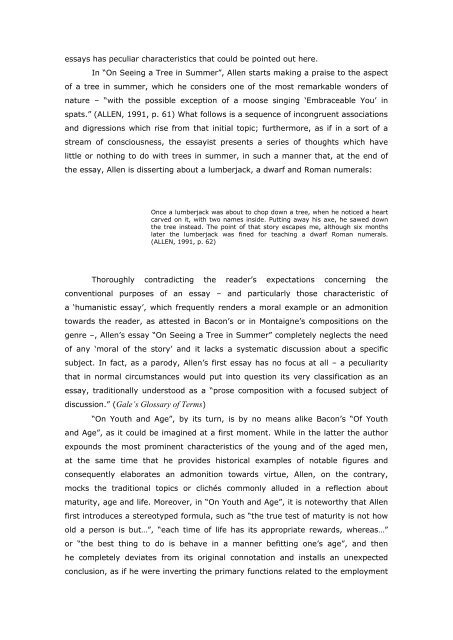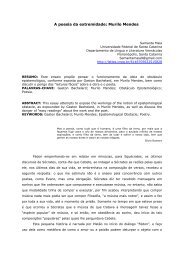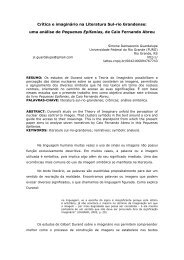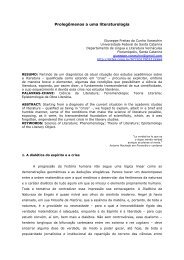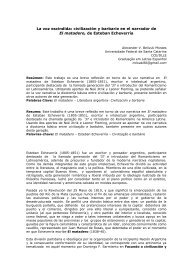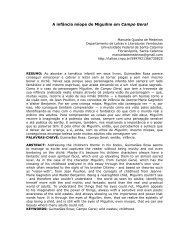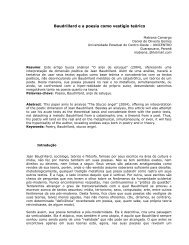Incongruity and Comicality in Woody Allen's prose
Incongruity and Comicality in Woody Allen's prose
Incongruity and Comicality in Woody Allen's prose
You also want an ePaper? Increase the reach of your titles
YUMPU automatically turns print PDFs into web optimized ePapers that Google loves.
essays has peculiar characteristics that could be po<strong>in</strong>ted out here.<br />
In “On See<strong>in</strong>g a Tree <strong>in</strong> Summer”, Allen starts mak<strong>in</strong>g a praise to the aspect<br />
of a tree <strong>in</strong> summer, which he considers one of the most remarkable wonders of<br />
nature – “with the possible exception of a moose s<strong>in</strong>g<strong>in</strong>g ‘Embraceable You’ <strong>in</strong><br />
spats.” (ALLEN, 1991, p. 61) What follows is a sequence of <strong>in</strong>congruent associations<br />
<strong>and</strong> digressions which rise from that <strong>in</strong>itial topic; furthermore, as if <strong>in</strong> a sort of a<br />
stream of consciousness, the essayist presents a series of thoughts which have<br />
little or noth<strong>in</strong>g to do with trees <strong>in</strong> summer, <strong>in</strong> such a manner that, at the end of<br />
the essay, Allen is dissert<strong>in</strong>g about a lumberjack, a dwarf <strong>and</strong> Roman numerals:<br />
Once a lumberjack was about to chop down a tree, when he noticed a heart<br />
carved on it, with two names <strong>in</strong>side. Putt<strong>in</strong>g away his axe, he sawed down<br />
the tree <strong>in</strong>stead. The po<strong>in</strong>t of that story escapes me, although six months<br />
later the lumberjack was f<strong>in</strong>ed for teach<strong>in</strong>g a dwarf Roman numerals.<br />
(ALLEN, 1991, p. 62)<br />
Thoroughly contradict<strong>in</strong>g the reader’s expectations concern<strong>in</strong>g the<br />
conventional purposes of an essay – <strong>and</strong> particularly those characteristic of<br />
a ‘humanistic essay’, which frequently renders a moral example or an admonition<br />
towards the reader, as attested <strong>in</strong> Bacon’s or <strong>in</strong> Montaigne’s compositions on the<br />
genre –, Allen’s essay “On See<strong>in</strong>g a Tree <strong>in</strong> Summer” completely neglects the need<br />
of any ‘moral of the story’ <strong>and</strong> it lacks a systematic discussion about a specific<br />
subject. In fact, as a parody, Allen’s first essay has no focus at all – a peculiarity<br />
that <strong>in</strong> normal circumstances would put <strong>in</strong>to question its very classification as an<br />
essay, traditionally understood as a “<strong>prose</strong> composition with a focused subject of<br />
discussion.” (Gale’s Glossary of Terms)<br />
“On Youth <strong>and</strong> Age”, by its turn, is by no means alike Bacon’s “Of Youth<br />
<strong>and</strong> Age”, as it could be imag<strong>in</strong>ed at a first moment. While <strong>in</strong> the latter the author<br />
expounds the most prom<strong>in</strong>ent characteristics of the young <strong>and</strong> of the aged men,<br />
at the same time that he provides historical examples of notable figures <strong>and</strong><br />
consequently elaborates an admonition towards virtue, Allen, on the contrary,<br />
mocks the traditional topics or clichés commonly alluded <strong>in</strong> a reflection about<br />
maturity, age <strong>and</strong> life. Moreover, <strong>in</strong> “On Youth <strong>and</strong> Age”, it is noteworthy that Allen<br />
first <strong>in</strong>troduces a stereotyped formula, such as “the true test of maturity is not how<br />
old a person is but…”, “each time of life has its appropriate rewards, whereas…”<br />
or “the best th<strong>in</strong>g to do is behave <strong>in</strong> a manner befitt<strong>in</strong>g one’s age”, <strong>and</strong> then<br />
he completely deviates from its orig<strong>in</strong>al connotation <strong>and</strong> <strong>in</strong>stalls an unexpected<br />
conclusion, as if he were <strong>in</strong>vert<strong>in</strong>g the primary functions related to the employment


